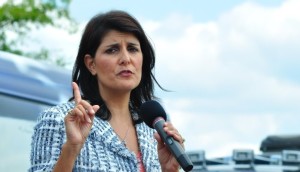With the worldwide cinema release of Fifty Shades of Grey just days away, I find my mind turning over and over on questions about women, sex, and work. On the one hand, millions of women apparently found the book intriguing, even liberating, when it first came out. On the other hand, the story romanticizes the discovery of sexuality in a relationship where the innocent young female lead follows commands, including about what she can eat, and gets beaten by her older, rich “boyfriend.” To further confuse things, the movie comes out on Valentine’s Day. What’s the message: is this love?
Even those close to the film feel ambivalent about it. In a recent interview in Time Magazine, leading man, actor Jamie Dornan, said the following: “I don’t want my daughter to see the movie… But I can’t stop her seeing it one day. I’d do everything in my power that she doesn’t, but what can I do?” I wonder why Mr. Dornan thinks it’s okay for the rest of our daughters to see it. But more generally, even he can’t avoid the potential harm done when popular culture reinforces ideas like these.
The Fifty Shades cinematographer expressed similar views in the same article. “I have a 14-year-old daughter, and I wonder about the images and the stories that we send out.” He strangely added, “it wasn’t a film that I wanted to do particularly.” He goes on to explain that the director was so terrific he wanted the opportunity to work with her.
I can’t wrap my head around these comments. They seem to violate the Golden Rule. If you don’t want your own daughters to see the images in your movie, or to internalize the messages it sends them about themselves, then you might pause before subjecting everyone else’s kids to your film. The same goes for the messages you’re sending to young men.
My own stand here is clear.
But then I need to concede that ticket pre-sales for this movie are among the highest ever, and large groups of fans stand at the ready to cheer for the submissive Anastasia Steele and her dominator Christian Grey. The plotline hits a nerve that excites a lot of people, including women. So the issue is not as simple as it appears to me.
Women’s Worth is a Leadership Issue
The troubling consequences here go beyond confusing teenagers about the place of violence in relationships — though you don’t need to see the Ray Rice elevator video to know why the wrong messages on that front are very dangerous. In the professional circles I travel in, the undermining of women’s inherent value plays out at work, even at the most senior levels.
Admittedly, this is a thorny set of issues that eludes a simple solution. Rather than offer a false “quick-fix,” I want to share a few data points that I encounter in my leadership work with executives. And then invite a dialogue of where to go from here.
- On a weekly basis, I find myself in conversations about the lack of women in senior leadership roles. So few women CEO’s. Not enough women on boards. Lack of gender diversity in tech. From London to Silicon Valley, concern abounds about the lousy percentage of women in the senior ranks of corporate life. Everyone talks about the complexity of balancing a career with raising a family. Yet fairly quickly these conversations turn to women’s identity, and the problem that they don’t “see themselves” as CEO material. Women’s perception of their self-worth is a real obstacle to them reaching the top, which means many of our strong leaders fall through the cracks because they’ve understood they’re not worthy to lead.
- Not every week, but at a very troubling frequency, I have a heart-wrenching conversation with a male executive on the same topic: their daughters and eating disorders. Behind their fancy suits and excel spreadsheets, men are suffering as they watch their daughters suffer with self-loathing and self-inflicted harm (and no doubt, women as well, but I tend to have these discussions with men). As one of them said to me, “there is nothing more painful for a parent than to fail at feeding your child.” Needless to say, behind each of these conversations is a young woman or girl whose self-esteem is so low or body image so distorted that she is starving herself. She will soon grow up and enter the work world.
- I personally feel bombarded by the obsession in pop culture about naked women. From Kim Kardashian ‘breaking the internet’ to Rihanna’s ever-so-stylish see-through dress, I see glamorized images of naked women all over the place. Though you can dismiss these as publicity stunts or fodder for low-brow magazines at the check-out counter, they matter. I consider myself a highly confident person. I have impressive degrees and a proven track record at advising some of the most senior professionals in the world. And yet, behind my fancy suit and excel spreadsheets, I find myself wondering in the taxi to a meeting, “is my lipstick too red? Should I change to pink?” “Does my hair look okay?” “Is my outfit appropriate but still a little sexy, but not too sexy, but not not-sexy-at-all?”
These examples take place behind the scenes. They don’t include more public breakdowns like the Vanderbilt rape case or the disastrous history of Bill Cosby. Yet like the fictional Fifty Shades of Grey, each of those also play a role in shaping how women understand their worth. At times it feels like a heady cocktail mixed with physical beauty (photo-shopped for a “perfect” body), a willingness to step off or down the professional ladder if you want kids, and sex appeal. Much worse is the view of women’s worth by Bill Cosby and his more recent followers at Vanderbilt.
But to come full circle, I know I run the risk of oversimplifying. Kardashian said her naked photo shoot made her feel strong. And Rihanna said she hoped her invisible dress “empowered” young women. When I talked with friends about these comments, some agreed with them. Like the celebrities themselves, they saw freedom, a celebration of sensuality, and a claim for women’s power.
So, many questions remain. That tells me we need a lot more reflection and engagement with these issues if we want to see healthy teenage girls who become high potentials at work, and executive suites filled with both self-respecting men and self-confident women.
I welcome your input to this dialogue.


